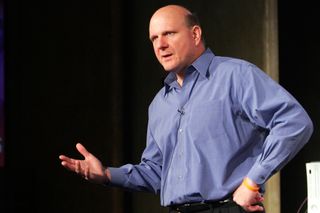Microsoft: One year under Steve Ballmer
It's been one year since Bill Gates left Microsoft in Steve Ballmer's hands. What kind of year have we seen?

When, in a now-infamous YouTube clip, Microsoft's Steve Ballmer ran onto a stage and started chanting "Developers, developers, developers", sweat pouring off his head, he didn't give the impression as the natural successor to William Gates III.
Yet when Gates decided to finally leave his formal position at Microsoft twelve months ago, it was Ballmer who assumed control of the company. But just what kind of year has he had?
The honest answer: not a bad one.
Inheritance
Ballmer inherited a Microsoft that was potentially wobbling a little.
Twelve months ago, Google and Yahoo had just announced a deal that would allow the former's ad technology onto the latter's sites. Windows Vista was still struggling to achieve its hoped-for numbers. And the firm was recovering from the EC slapping it with a record 1.35bn fine for anti-trust and anti-competitive behaviour.
With its products struggling to hold market share although, granted, they still had a lot of market share it threatened to be a defining moment for Microsoft, and suggestions were rife that Ballmer had inherited something of a poisoned chalice.
Get the ITPro. daily newsletter
Receive our latest news, industry updates, featured resources and more. Sign up today to receive our FREE report on AI cyber crime & security - newly updated for 2024.
It's fair to say that his ascension to the top seat didn't have an immediate impact, but as his first year went on, things started looking up for Microsoft. Firstly, outside of its control, the suggested Google and Yahoo union was abandoned in November of 2008, when Google got word that US regulators would investigate it were it to go ahead.
The threat to Microsoft had this gone ahead was not small. The firm and Ballmer was reportedly the driving force behind this had spent the first half of 2008 pursuing Yahoo, with an offer that was originally just shy of $50 billion. With the kindness of hindsight, Microsoft must feel it had a narrow escape.
When Yahoo was eventually successful in resisting Microsoft's overtures at the ultimate expense of its share price and chief exec Jerry Yang's job it was placed second in the internet search market, although a country mile behind first place. A deal with Google would have left Microsoft even further behind the competition, yet when said deal fell through, Yahoo was exposed. And Microsoft, this time, was primed to take advantage.
Bing and Windows
At the end of May 2009, it launched its new search engine Bing, developed at a fraction of the cost of the Yahoo deal. And within one week, it had snatched second place from its long-time rival. Initially, this was put down to the novelty factor, but continuing numbers have suggested that Bing may be bedding in.
According to Comscore numbers, Bing had snatched 12 per cent of the search market by the second week of June. That said, Google was expanding market share too, yet at the very least, Bing has been damaging Yahoo, and finally giving Microsoft a platform to at least attack Google with.
Even Ballmer, however, has had to concede that it would take years to get near Google's position. But it's still looking stronger than a year ago.
And Ballmer has other successes to celebrate. For, with its Windows 7 product, Microsoft seems to have re-seized the initiative in the area of its business on which is most depends.
At the core of the warm response that Windows 7 has been getting is the openness at the heart of the product. Keen to placate the naysayers who were underwhelmed by Windows Vista, Microsoft took the risk of allowing anyone up to a certain number to download and try a beta version of Windows 7 for free. When that number limit was hit, the firm quickly reacted, and lifted such restrictions.




